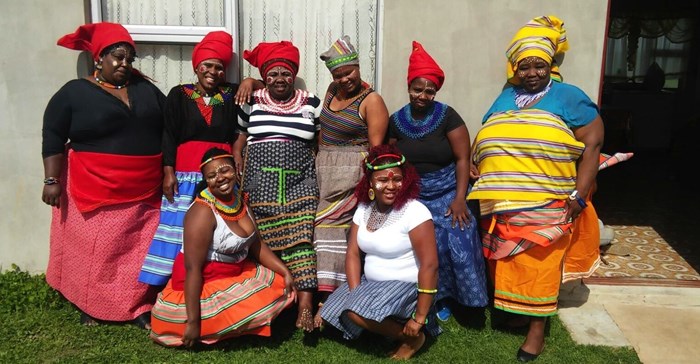The agricultural sector has shed 44,000 jobs nationwide in the first quarter of this year alone, seeing Eastern Cape farming communities under increasing pressure to create sustainable livelihoods for residents. According to Agri Eastern Cape President Doug Stern, high rural unemployment rates in the province are often alleviated only by seasonal industry jobs such as fruit picking and sheep shearing.
Amid the pared down farming units focused on food security, Agri Eastern Cape members have become innovative in battling the spiralling unemployment rate in their communities. “Our rural communities are often faced with a range of socio-economic problems, such as alcohol and substance abuse, family issues and crime. Many of our members are working hard to assist the unemployed by building small businesses and other creative enterprises in addition to their farming activities.”

This group of women from the farm Rosenhof near Humansdorp is one of a number of successful creative development enterprises to emerge from employee wellness programmes implemented by Agri Eastern Cape members. Their clothing and beaded accessories brand, African Queens, aims to upskill more unemployed women in the area. (Image: Supplied)
"Boerseep" - putting by-products to good use
In Cradock, cattle farmer’s wife Tracey Michau started up her "Boerseep" soap-making business earlier this year as a way of putting the discarded beef tallow by-product to good use. Now her start-up is giving the local community a hand up. “I discovered the old family recipe about a year ago and once I started making the soap, I realised there was a whole community of women that would benefit immensely from employment,” said Michau.
Although the product is still in its infancy, Michau said her research indicated that there was a market for it, with existing distribution points at farm stalls and online organic stores. She is currently training a member of the community in the entire production process, who in turn will be able to transfer those skills as the team grows. Michau’s intention is to secure employment for the women who assist with the sorting and classing of mohair after the farm’s Angora goats are shorn twice a year.
“The soap takes three weeks to cure and we are currently producing around 700 bars per month. Besides creating sustainable employment for the women on our farm, the soap is also a project of mine that will fund my long-term goal of garlic production. I will utilise the same team of women, as intensive labour is only required for planting and harvesting.”
From designer textiles to arts and crafts
An ongoing success story comes from Fish River Mouth near Port Alfred, where Agri EC member Adéle Cutten established her mohair business more than 30 years ago.
Formerly a working pig farm, Cutten converted the old sty buildings into a labour-intensive cottage industry, which today employs 55 women for various semi-skilled and skilled tasks, such as spinning, dyeing, beading, knitting and crochet work. The women produce designer knitting yarns, fashion accessories and home textiles for the national and export market. Cutten said the Adéle’s Mohair brand had also expanded in response to global market demand to include a wider variety of natural fibres such as wool, alpaca, silk, and bamboo, in the offering.
“Nationally, our products are mainly focused around tourism places in the Western Cape and a few small yarn shops dotted around. Internationally, our market is very widespread – from Japan to Russia, through Europe into Scandinavia, the UK and into America – at least 20 countries,” said Cutten.

Adéle’s Mohair near Fish River Mouth has been providing employment for rural communities for over 30 years. Here founder and Agri EC Adéle Cutten (left) and long-time employee Liz Dyakala (right) inspect the team’s new uniforms. (Image: Supplied)
Similarly, Elsona de Klerk of the Graaff-Reinet district started training employees on her farm to paint tablecloths and placemats as part of a small business initiative just shy of two decades ago. The products proved so popular that she opened a studio and retail store in town and has since trained around a hundred community members in crafts, ranging from fabric painting and textiles to woodwork and ceramics. Their products, too, are exported worldwide under the Elsona Studio label. “We have come a long way and today some forty wonderfully skilled women and men are providing for their families as a direct result of this project,” said De Klerk.
In addition, Stern said a number of Agri EC members were partnering with facilitative organisations like Ekwip, which works with farmers and farmworkers in the Kouga region to address community wellbeing and equip employees and their families with essential income-generating and life skills.

































